Lord Randolph Churchill, who seems to be a great friend
of Mr. Wainwright's, made a very clever speech for him at Barrow on Monday; but whether the cleverness of his speech did more good to Mr. Wainwright than the mercurial political reputation of Lord Randolph did harm, it is difficult to say. He insisted on the obligations which Mr. Caine owed to the Tory Party in Barrow for loyally supporting him at the General Election of 1886 against the Home-rulers of Barrow, and made a bad pun on his name, saying that when he remem- bered the ungovernable fury Mr. Caine had displayed against his former friends, he was obliged to go back to that very early progenitor of Mr. Caine, before history began, when Cain sacrificed Abel to a similar burst of ungovernable fury. He maintained that when the Government found the consumption of spirits increasing so rapidly, they were bound to do something if they could which would seriously check it, and that they could have done nothing better than pat on new spirit-duties, and apply the proceeds to ex- tinguishing licences which were fostering the consumption of alcohol. The Radicals, he said, no sooner saw the oppor- tunity of attacking the Government for doing anything to buy out publicans, than they utterly ignored the grave moral reasons for the step proposed, and directed a fierce attack on what they called the Publicans' Endowment Bill; and the attack was led by Mr. Caine, who ignored all these reasons, in the first instance, and next did all in his power to break up the Unionist Party, though he called himself a Unionist. "Rather than give a shilling of compensa- tion to an interest which might be injuriously affected by reform," these Radicals "would infinitely prefer to see every man, woman, and child in England in the last paroxysms of delirium tremens."














































 Previous page
Previous page